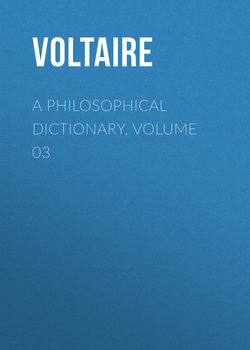Читать книгу A Philosophical Dictionary, Volume 03 - Voltaire, Вольтер - Страница 13
CHINA
ОглавлениеSECTION I
We have frequently observed elsewhere, how rash and injudicious it is to controvert with any nation, such as the Chinese, its authentic pretensions. There is no house in Europe, the antiquity of which is so well proved as that of the Empire of China. Let us figure to ourselves a learned Maronite of Mount Athos questioning the nobility of the Morozini, the Tiepolo, and other ancient houses of Venice; of the princes of Germany, of the Montmorencys, the Chatillons, or the Talleyrands, of France, under the pretence that they are not mentioned in St. Thomas, or St. Bonaventure. We must impeach either his sense or his sincerity.
Many of the learned of our northern climes have felt confounded at the antiquity claimed by the Chinese. The question, however, is not one of learning. Leaving all the Chinese literati, all the mandarins, all the emperors, to acknowledge Fo-hi as one of the first who gave laws to China, about two thousand five hundred years before our vulgar era; admit that there must be people before there are kings. Allow that a long period of time is necessary before a numerous people, having discovered the necessary arts of life, unite in the choice of a common governor. But if you do not make these admissions, it is not of the slightest consequence. Whether you agree with us or not, we shall always believe that two and two make four.
In a western province, formerly called Celtica, the love of singularity and paradox has been carried so far as to induce some to assert that the Chinese were only an Egyptian, or rather perhaps a Phœnician colony. It was attempted to prove, in the same way as a thousand other things have been proved, that a king of Egypt, called Menes by the Greeks, was the Chinese King Yu; and that Atoes was Ki, by the change of certain letters. In addition to which, the following is a specimen of the reasoning applied to the subject:
The Egyptians sometimes lighted torches at night. The Chinese light lanterns: the Chinese are, therefore, evidently a colony from Egypt. The Jesuit Parennin who had, at the time, resided five and twenty years in China, and was master both of its language and its sciences, has rejected all these fancies with a happy mixture of elegance and sarcasm. All the missionaries, and all the Chinese, on receiving the intelligence that a country in the extremity of the west was developing a new formation of the Chinese Empire, treated it with a contemptuous ridicule. Father Parennin replied with somewhat more seriousness: "Your Egyptians," said he, "when going to people China, must evidently have passed through India." Was India at that time peopled or not? If it was, would it permit a foreign army to pass through it? If it was not, would not the Egyptians have stopped in India? Would they have continued their journey through barren deserts, and over almost impracticable mountains, till they reached China, in order to form colonies there, when they might so easily have established them on the fertile banks of the Indus or the Ganges?
